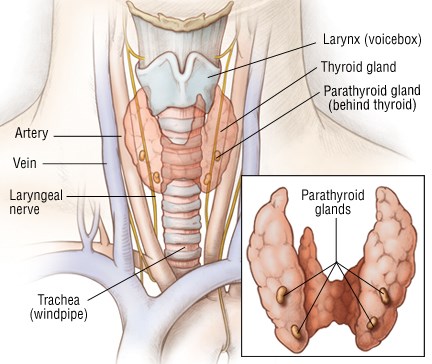About the Parathyroid Glands
Just about everyone you talk to is at least somewhat familiar with the thyroid gland and what it does. After all, we all want to stay fit with appropriate body weights for our heights and builds, so knowing about the gland that controls our metabolism is definitely of interest.
Located just behind the thyroid, are a set of four glands that are just as important to your health and wellness as the thyroid. The parathyroid glands control the level of calcium in your bloodstream. Proper calcium levels are essential for your muscles to contract and for your nerves to function properly, not to mention calcium’s importance to your bone density.
So whether you have heard of the parathyroid glands or not, you may want to pay close attention as we go over what happens when your parathyroid glands are underactive and when they are overactive. Either of the two cases can be extremely detrimental to your health and life risking.
Normal Parathyroid Glands

Your parathyroid glands are directly connected to your vascular system. All of your blood filters through these glands, and as it does so, they monitor the level of calcium in your bloodstream. If the level is too low, the glands make a greater amount of parathyroid hormone (PTH), and if the level is too high, they produce less PTH.
When PTH is released into your system, it circulates throughout the body and functions to increase the calcium in your bloodstream. If you are not getting enough calcium in your diet, your PTH will, among other places, get calcium for your bloodstream by harvesting it from your bones. As such, it is important to drink your milk!
When your calcium levels are too high, your parathyroid glands may stop making PTH altogether for a time until your calcium levels have decreased on their own. With properly functioning parathyroid glands and a good diet with enough calcium you should not have any issues with losing bone density due to your body’s need for calcium.
Hypoparathyroidism (Underactive Parathyroid Glands)
When your parathyroid glands stop producing PTH or do not produce enough of it, your body has no hormones working to increase calcium levels in your bloodstream. That means if your diet is at all deficient in calcium, you will feel fatigue, headaches, unstable moods and/or depression, muscle aches, and other unpleasant symptoms like painful menstruation (for women) and muscle spasms.
Even if you do get enough calcium in your diet, your body can still experience a lack of ionised calcium in the bloodstream due to lack of PTH.
Hyperparathyroidism (Overactive Parathyroid Glands)
When your parathyroid glands are overactive, it does not really matter how much calcium you are getting in your diet: they will keep producing high levels of PTH. This can be extremely dangerous. As we discussed, one of the sources PTH uses to increase calcium in the bloodstream is bone.
Excess PTH can lead to loss of bone density, and excess calcium is also linked with some cancers. If you suffer from osteoporosis, abdominal pain, kidney stones, fatigue, depression, and/or joint aches and pains, you may be suffering from hyperparathyroidism.
Treatments
Fortunately, there are treatments for both hypoparathyroidism and hyperparathyroidism. For underactive parathyroid glands, your doctor will usually prescribe calcium and vitamin D supplements. This essentially keeps your blood’s calcium levels high enough that your parathyroid glands do not need to kick in with any PTH anyway.
If one of your parathyroid glands is overactive, a condition called parathyroid adenoma, that gland may need to be surgically removed. Parathyroid surgery is a minimally invasive procedure which is safe and effective. The procedure usually lasts around one hour and can be performed as day surgery or with an overnight stay.
If you have questions or concerns about parathyroid health make an appointment to see our thyroid surgeon.

